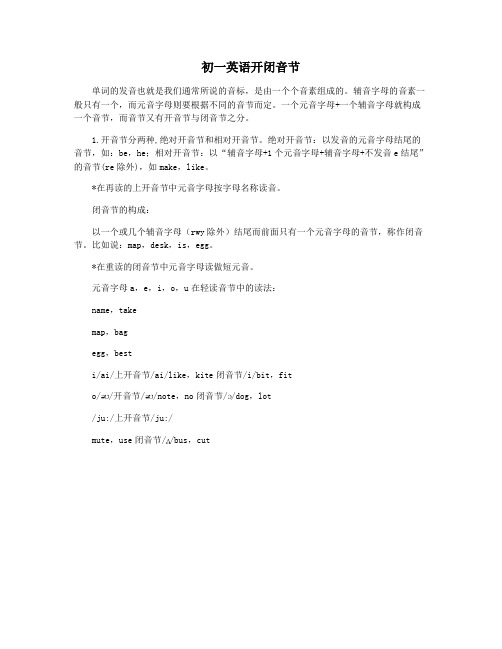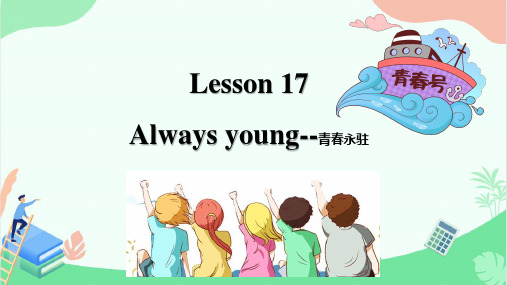【微课视频】初中英语语法MUSIC17
初中英语人教版七年级下册微课课件

A: What did ___ you do yesterday? B: I _____ went to the movie.
A: What did ___ you do last weekend? B: I did ___ my homework.
What did you do ___ last weekend? We ____________________ visited the fire station. How was ___ your trip last weekend? It was boring. do last weekend? What did they ___ Theypicked ______________________ some strawberries. How were ____ the strawberries? They were delicious.
地点 Where did she work last year?
主语 Who worked in a hospital last year?
every day yesterday
• I get home at 5:00 every day. I got home at 5:00 yesterday. • Jack sees a movie every day. Jack saw a movie yesterday. • She buys lunch in the shop every day. She bought lunch in the shop yesterday. • There are many people in our school every day. There were many people in our school yesterday.
初一英语开闭音节

初一英语开闭音节
单词的发音也就是我们通常所说的音标,是由一个个音素组成的。
辅音字母的音素一般只有一个,而元音字母则要根据不同的音节而定。
一个元音字母+一个辅音字母就构成一个音节,而音节又有开音节与闭音节之分。
1.开音节分两种,绝对开音节和相对开音节。
绝对开音节:以发音的元音字母结尾的音节,如:be,he;相对开音节:以“辅音字母+1个元音字母+辅音字母+不发音e结尾”的音节(re除外),如make,like。
*在再读的上开音节中元音字母按字母名称读音。
闭音节的构成:
以一个或几个辅音字母(rwy除外)结尾而前面只有一个元音字母的音节,称作闭音节。
比如说:map,desk,is,egg。
*在重读的闭音节中元音字母读做短元音。
元音字母a,e,i,o,u在轻读音节中的读法:
name,take
map,bag
egg,best
i/ai/上开音节/ai/like,kite闭音节/i/bit,fit
o/əʊ/开音节/əʊ/note,no闭音节/ɔ/dog,lot
/ju:/上开音节/ju:/
mute,use闭音节/ʌ/bus,cut。
新概念英语第二册Lesson17详细教案笔记

【New words and expressions】(5)★appear [əˈpɪə(r)](1)v. 登场,扮演(本文意思)eg. The singer can’t appear tonight because of his illness.这个歌手今晚因为生病不能登台演出了。
(2) v. 出现(反:dis appear 消失)eg. The plane appeared. / The plane disappeared.飞机出现了。
/飞机消失了。
(3) 似乎,看起来好像(系动词,后面必须 + 形容词)eg. He appeared nervous. 他看起来很紧张。
He appeared to know you. 他似乎认识你。
★stage [steɪdʒ] n. 舞台,时期eg. backstage 后台on the stage 在舞台上in the stage 在某一阶段(时期)★bright [braɪt] adj.(1)明亮的(反:dim 昏暗的)eg. What a bright room! 多明亮的一个房间啊!bright eyes 明亮的眼睛bright and early 一大早,一清早look at the bright side往好的方面看,持乐观态度(2)鲜艳的eg. bright red 大红色bright yellow 嫩黄色bright blue 宝蓝色(3)聪明的 = clever(修饰人)★ stocking [ˈstɒkɪŋ] n.(女用)长筒袜★ sock [sɒk] n. 短袜eg. a pair of woolen stockings/socks一双羊毛长袜/短袜【课文讲解】1、My aunt Jennifer is an actress.我的姑姑詹妮弗是位演员。
●形容词性物主代词(后面必须跟名词):my,your,his,her,its, our, your, their●名词性物主代词(后面不能跟名词):mine, yours, his, hers, its, ours, yours,theirs eg. This is my bag. = This bag is mine.●aunt 阿姨,婶婶… (ant 蚂蚁)uncle 叔叔,舅舅… (ankle 脚踝)●act or男演员—— actr ess女演员airhost ess空姐wait er男服务员—— waitr ess女服务员prince 王子—— princ ess公主lion 公狮—— lion ess母狮tig er雄老虎—— tigr ess雌老虎,凶悍的女人2、She must be at least thirtyfive (years old).她至少也有35岁了。
Unit2知识点汇总2024-2025学年(2024)七年级英语上册

新版外研社英语七(上)Unit2 知识点汇总一.词性变化1.fun(n.乐趣;adj.有趣的)——funny(adj.有趣的;滑稽的)2.sound:n.声音v.听起来3.different(adj.不同的)——difference(n.差异)4.sudden(adj.突然的)+ly(副词后缀)=suddenly(adv.突然地)5.feel(v.觉得)+ing(名词后缀)=feeling(n.感觉)6.direct(adj.直接的)+ly(副词后缀)=directly(adv.直接地)7.love(v.爱)去e+er(名词后缀,表示人)=lover(n.爱好者)8.plete(v.竞争)——petition(n.竞争)9.act(v.行动)+ion(名词后缀)=action(n.行为;行动)10.a(形容词前缀)+wake(v.醒来)=awake(adj.醒着的)11.mid(前缀,中间的)+night(n.晚上)=midnight(n.午夜)12.shelf(n.架子)——(pl.shelevs)13.nervous(adj.神经紧张的)+ly(副词后缀)=nervously(adv.焦虑不安地)14.write(v.写)+ing(名词后缀)=writing(n.写作)15.end(v.结束)+ing(名词后缀)=ending(n.结局)二.重点短语1.plant flowers 种花2.ride a bike 骑自行车3.play the violin 拉小提琴4.rock music 摇滚乐5.e out 1. 出来2. 开花3. 出版6.play the electric guitar 弹电吉他7.write songs 写歌8.at this moment 在这时;此刻9.the sound of... ……的声音10.a different kind of... 一种不同类型的……11.a fan of.. 一个……的迷12.put together 组合13.rush into 冲进14.decide to do sth. 决定做某事15.nod to sb. 向某人点头16.fire up 发动(机器),启动(设备)17.take part in=join in 参加某活动18.have great fun 玩得开心19.have interest in 对……感兴趣20.win the first prize 获一等奖21.from then on 从那时起22.start to do sth. 开始做某事23.hundreds of 成百上千的24.take...for example 以……为例25.more and more 越来越多26.fly into 飞进;飞入27.on the ground 在地上28.hold up 举起;抬起29.fly away 飞走30.at the beginning 在开头31.take off 起飞32.take sb. To sp. 带某人去某地33.make a poster 制作海报34.at midnight 在午夜35.tap on the door 轻敲门36.on a shelf 在架子上37.feel a bit lonely 感到有点孤独38.shake one’s head 摇头39.want to do sth. 想要做某事40.make friends 交朋友41.look forward 环顾四周;到处看看42.on Wednesday 在周三三.重点句子1.What is your hobby?你的爱好是什么?2.What do you think of their hobbies?你认为它们的爱好怎么样?3.There is so much fun in music.音乐有很多乐趣。
初一英语44个音标的读法

初一英语44个音标的读法一、元音1.单元音:/i:/:发音时舌尖抵下齿,舌前部尽量抬高,嘴唇向两旁伸开,成扁平形。
例如:bee(蜜蜂)中的“ee”发音。
读音类似汉字“衣”的长音。
/ɪ/:发音时舌尖抵下齿,舌前部抬高,舌位中高,不圆唇。
例如:sit(坐)中的“i”发音。
读音类似汉字“衣”的短音。
/e/:发音时舌尖抵下齿,舌前部稍抬起,唇形稍扁,开口度比 /ɪ/大。
例如:bed(床)中的“e”发音。
读音类似汉字“哎”。
/æ/:发音时舌尖抵下齿,舌前部最低,双唇向两旁平伸,成扁平形。
例如:cat(猫)中的“a”发音。
读音类似汉字“哎”的短而急促音。
/ɑ:/:发音时口张大,舌身压低并后缩,舌尖不抵下齿。
例如:car(汽车)中的“ar”发音。
读音类似汉字“啊”的长音。
/ʌ/:发音时舌尖和舌端两侧轻触下齿,舌后部靠前部分稍抬起,唇形稍扁,开口度较大。
例如:cup(杯子)中的“u”发音。
读音类似汉字“啊”的短音。
/ɔ:/:发音时双唇收得小而圆,并向前突出,舌身往后缩。
例如:all(全部)中的“al”发音。
读音类似汉字“哦”的长音。
/ɒ/:发音时口张大,舌身尽量降低并后缩,双唇稍稍收圆。
例如:hot(热的)中的“o”发音。
读音类似汉字“哦”的短音。
/u:/:发音时舌后部尽量抬起,双唇收圆并突出,口形小而圆。
例如:food(食物)中的“oo”发音。
读音类似汉字“乌”的长音。
/ʊ/:发音时舌后部抬起,双唇收圆,稍突出,比 /u:/ 稍放松些。
例如:book(书)中的“oo”发音。
读音类似汉字“乌”的短音。
/ə/:发音时舌身平放,舌中部微微隆起,双唇扁平。
例如:about (关于)中的“a”发音。
读音类似汉字“呃”。
/ɜ:/:发音时舌身平放,舌中部稍抬起,双唇扁平。
例如:bird (鸟)中的“ir”发音。
读音类似汉字“呃”的长音。
2.双元音:/eɪ/:由/e/向/ɪ/滑动,发音过程中口形由半开到合,舌位由低到高。
七年级上册英语课件unit

七年级上册英语课件u n i tTTA standardization office【TTA 5AB- TTAK 08- TTA 2C】七年级上 Unit 1 My name's Gina.❖语法详解:形容词性物主代词:概念:形容词性物主代词是用来表示所有关系的代词,有人称和数的变化。
用法:①形容词性物主代词不能单独使用,其后必须接名词,即在名词前作定语。
②形容词性物主代词不能与冠词和指示代词连用。
③形容词性物主代词与形容词一起修饰名词时,其顺序应为:形容词性物主代词+形容词+名词。
如:my red pen 我的红色钢笔BE动词一般疑问句Ⅰ:概念:一般疑问句是指可以用Yes或No回答的疑问句。
本单元主要学习be动词的一般疑问句。
结构:Be动词+主语+其他?回答:Yes,主语+be.(肯定回答)/No,主语+be not.(否定回答) 如:—Is he Jim他是吉姆吗—Yes,he is./No,he isn't.是的,他是。
/不,他不是。
be动词可缩写与不可缩写的情况:be动词可缩写的情况①一般am,is,are与前面的名词或代词缩写时,省去前面的元音字母并在省去的地方加“'”。
如:I am→I'm; what is→what's; you are→you're②not与be动词的缩写形式。
如:are not→aren't; is not→isn'tbe动词不可缩写的情况①this is,am not,those/these are都没有缩写形式。
②在一般疑问句的简略回答中,肯定回答时,代词不能与am,is,are缩写。
如:Are you Tom你是汤姆吗正:Yes,I am. 误:Yes,I'm.❖语法专练一、用所给词的适当形式填空。
1.Hello! ___ (I) am 's ______ (you) name?2.Are _____ Jack(you)3.—How are ______—I'm fine,thank _____.(your)4.—What's _____ name?—_____ name is Tom.(he)5.—Is _____ Alice?—No,_____ isn' name's Mary.(she)二、按要求完成句子。
英语人教新目标八年级上册The Simple Past Tense微课

The Simple Past Tense
表示过去的时间状语 yesterday yesterday morning last+时间 last week/year/month 时间+ago two days ago
one year ago
just now in 2000
The Simple Past Tense
4. 特殊疑问句 1)疑问词+was/were 主语+其他? 2)疑问词+did+主语+V原形+其他?
---Where did she go yesterday? ---She went to the school. ---When was she at home? ---Yesterday.
The Simple Past Tense
The Simple Past Tense
Teaching Points
1.一般过去时的定义及构成 2.规则动词和不规则动词过去式的变化
The Simple Past Tense
Simple Past Tense 一般过去时
一般过去时描述在过去时间发生的动作或存在的状态。
Carol took some photos last Sunday. I was happy yesterday.
2. 否定形式: 1) 在行为动词前加didn’t,同时还原行为动词; 2) was/were + not
She didn't go to school yesterday. She wasn't at home yesterday.
The Simple Past Tense
3. 一般疑问句 1) Was/Were+主语+do sth.? 2) Did +主语+do+其他?
英语新概念2 Lesson17 Always Young 同步教学课件

In spite of this, she often appears on the stage as a young girl.
appears as……:扮演……角色(as:作为) appears on the stage as ……:扮演……(扮演的确切表达 ) work as……:最常用于介绍某人是做什么工作的 treat sb / sth as……:把sb/sth当作(看作)…… 例:He appears as a prince. 他扮演王子的角色。
My aunt Jennifer is an actress. She must be at least thirty-five years old. In spite of this, she often appears on the stage as a young girl. Jennifer will have to take part in a new play soon. This time, she will be a girl of seventeen. In the play, she must appear in a bright red dress and long black stockings. Last year in another play, she had to wear short socks and a bright, orange-coloured dress. If anyone ever asked her how old she is, she always answers, 'My dear, it must be terrible to be grown up!
a pair of socks 一双短袜 These pair of socks are beautiful. But I cannot afford them. 这些短袜很漂亮。但是我买不起。
